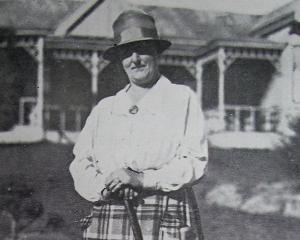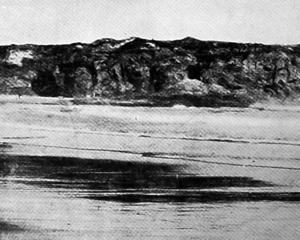
The cannon has an interesting history, and some considerable value must attach to it as a relic of the past. In 1827, or thereabouts, one Maori murdered another. The murderer was captured, sentenced to death, and a newly-appointed Maori preacher authorised to decide what form the execution should take. Crucifixion was decided upon, but when the man was tied to a rude cross a warrior suggested that the cannon above referred to, being a weapon made to kill with, should be used. The gun was loaded, beach stones being used as bullets, and fired from twenty paces, the result being that the murderer was blown to atoms. The cannon was subsequently designated "Te Pu Repu i Repe-katia ae Kohuru", the translation of which it is stated, is "the cannon that crucified the murderer".
Knitting revolution
The thousands of women throughout the dominion who are devoting every spare moment to the knitting of socks for their kith and kin on active service will be interested to know that an Otago resident, Miss Cornish, of Waikoikoi, having read in a magazine that two socks could be knitted at once, has discovered the method by which this can be done with highly favourable results. Miss Cornish proposes to have the directions printed, whereby the simultaneous knitting of two socks can be effected.
Shopkeepers’ rivalry
The arrest of a Chinese woman at an early hour on Friday morning under extraordinary circumstances, is recorded by the Wanganui correspondent of the Dominion. Ngan Kee and Co., fruiterers, in a large way, have been subjected to considerable losses lately by mysterious breaking of large gas globes under the verandah of their shop. Every time new globes were put on they were smashed. The police investigated matters, and a little after 1 o’clock on Friday morning the men on watch observed a figure quietly creeping along to the shop. One big globe was smashed, and just as the person was about to damage another with an iron bar the police flashed a searchlight in the face of the culprit, and discovered it was the wife of an opposition fruiterer. When they attempted to arrest her she gave vent to some weird screams, and violently struggled against capture. She tried her hardest to bite the constables, but they eventually landed her gaol. She was remanded on August 22, bail being allowed in two sureties of £50.
Reformed
According to a soldier who has returned wounded to Dunedin, some men who are sentenced for bad behaviour by courts-martial to terms of imprisonment make good when given the chance. The chance is made possible by reason of the fact that it is not always advisable at once to put into force a verdict of a court-martial. One Australian soldier was sentenced to five years’ imprisonment for some misdemeanour. He pleaded hard with his colonel for clemency. "Go and try to wipe out the stain on your character," was the advice of the colonel. Our informant states that for three days the Australian sought Death — he performed all manner of reckless and valorous deeds. But death passed him by unscathed. At the end of three days he had won the D.C.M. and Military Medal and — greater than these — his offence was forgiven. — ODT, 21.8.1917.
• COPIES OF PICTURE AVAILABLE FROM ODT FRONT OFFICE, LOWER STUART ST, OR WWW.OTAGOIMAGES.CO.NZ













